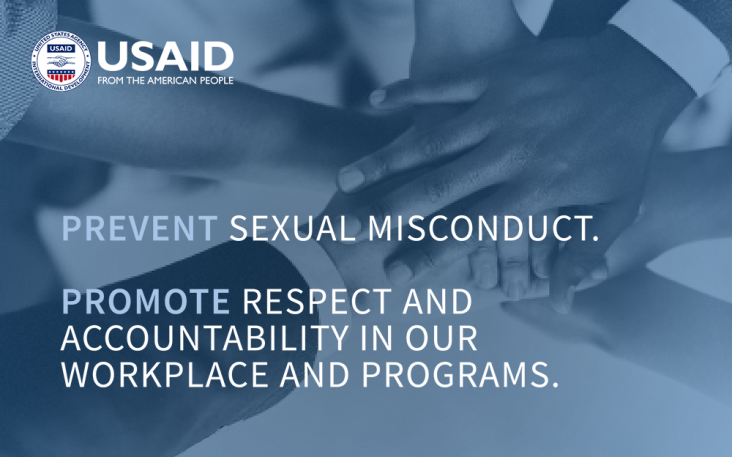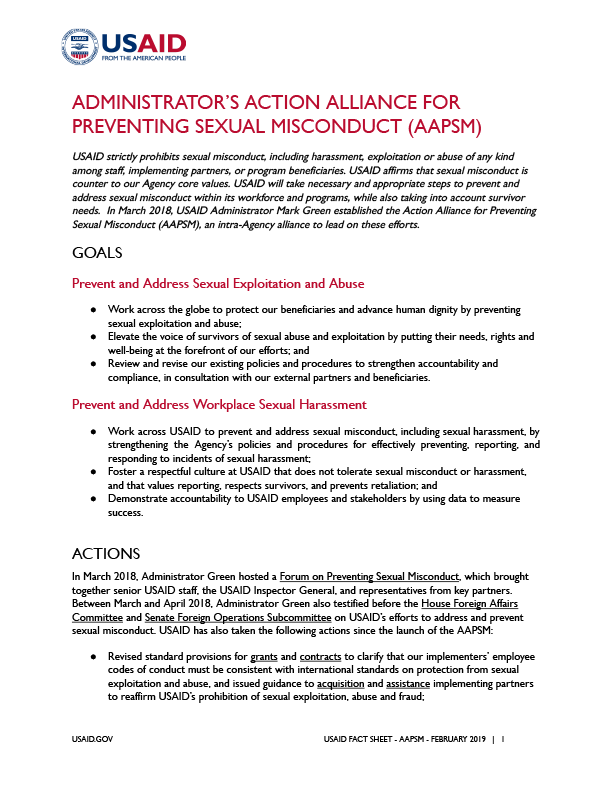- Work With USAID
- How to Work with USAID
- Organizations That Work With USAID
- Find a Funding Opportunity
- Resources for Partners
- Preventing Sexual Misconduct
- USAID Partners
- Acquisition & Assistance Ombudsman
- Acquisition & Assistance Policy Directives
- Development Information Solution (DIS)
- Indirect Cost Rate Guide for Non-Profit Organizations
- Procurement Executive Bulletins (PEBs)
- Progress Report - Fiscal Report 2019
- Implementing Partner Notices Portals
- Partner Vetting System
- Branding
- COVID-19 Guidance For Implementing Partners
- Preparing for a World Altered by COVID-19
- Section 889 Partner Information
- Careers
- Get Involved
Speeches Shim

USAID strictly prohibits sexual misconduct, including harassment, exploitation or abuse of any kind among staff and implementing partners. USAID affirms that sexual misconduct is counter to our Agency core values. USAID will take necessary and appropriate steps to prevent and address sexual misconduct within its workforce and programs, while also taking into account survivor needs. In March 2018, USAID Administrator Mark Green established the Action Alliance for Preventing Sexual Misconduct (AAPSM) to lead on these efforts.
GOALS
Prevent and Address Sexual Exploitation and Abuse
- Work across the globe to protect our beneficiaries and advance human dignity by preventing sexual exploitation and abuse;
- Elevate the voice of survivors of sexual abuse and exploitation by putting their needs, rights and well-being at the forefront of our efforts; and
- Review and revise our existing policies and procedures to strengthen accountability and compliance, in consultation with our external partners and beneficiaries.
Prevent and Address Workplace Sexual Harassment
- Work across USAID to prevent and address sexual misconduct, including sexual harassment, by strengthening the Agency’s policies and procedures for effectively preventing, reporting, and responding to incidents of sexual harassment;
- Foster a respectful culture at USAID that does not tolerate sexual misconduct or harassment, and that values reporting, respects survivors, and prevents retaliation; and
- Demonstrate accountability to USAID employees and stakeholders by using data to measure success.
ACTIONS
In March 2018, Administrator Green hosted a Forum on Preventing Sexual Misconduct, which brought together senior USAID staff, the USAID Inspector General, and representatives from key partners. Between March and April 2018, Administrator Mark Green testified before the House Foreign Affairs Committee and Senate Foreign Operations Subcommittee on USAID’s efforts to address and prevent sexual misconduct. USAID has also taken the following actions since the launch of the AAPSM:
- Revised standard provisions for grants and contracts to clarify that our implementers’ employee codes of conduct must be consistent with international standards on protection from sexual exploitation and abuse, and issued guidance to acquisition and assistance implementing partners to reaffirm USAID’s prohibition of sexual exploitation, abuse and fraud;
- Launched a mandatory, Agency-wide sexual harassment training, released an enhanced, mandatory counter-trafficking in persons (C-TIP) training, and piloted a new Respectful, Inclusive, and Safe Environments (RISE) training for USAID staff;
- Endorsed the G7 Whistler Declaration on Protection from Sexual Exploitation and Abuse in International Assistance, and led the issuance of the Tidewater Joint Statement on Combating Sexual Exploitation and Abuse in the Development and Humanitarian Sectors, and endorsed the OECD DAC Recommendation on Ending Sexual Exploitation and Abuse in Development Co-operation and Humanitarian Assistance;
- Conducted intensive global field consultations. Participants represented more than 100 countries and included more than 1,000 representatives from NGOs, 600 representatives from private contracting companies, and 150 representatives from public international organizations;
- Launched a comprehensive policy review and business process mapping to identify key gaps;
- Issued new USAID Employee Standards of Conduct outlining employee responsibilities and published an online Manager's Toolkit for preventing and addressing sexual misconduct; and,
- Along with 22 other donors, negotiated and signed on to groundbreaking international commitments on preventing sexual exploitation and abuse at the 2018 Safeguarding Summit.
NEXT STEPS
- Finalize comprehensive policies addressing internal sexual misconduct and sexual exploitation and abuse in our programming, accompanied by training and outreach;
- Ensure and track timely and appropriate response to reported allegations of sexual misconduct;
- Conduct global staff and implementing partner consultations, including in-depth focus groups;
- Establish new capabilities to build the capacity and awareness on SEA protections and accountability to affected populations, including releasing a new PSEA Partner Toolkit; and,
- Issue USAID Manager’s Toolkit 2.0 with additional resources and case studies.
REPORTING
- USAID employees are required, and implementing partners are encouraged, to report all allegations of sexual misconduct that affect beneficiaries — whether the allegations involve USAID personnel, grantees or contractors — to the Office of the Inspector General at ig.hotline@usaid.gov. Allegations of sexual exploitation and abuse involving employees of USAID’s grantees or contractors must also be reported to the relevant USAID Agreement or Contracting Officer.
- All allegations of internal workplace sexual misconduct at USAID can be reported to USAID’s Misconduct Reporting Portal at launchpad.usaid.gov. All USAID management officials are required to report allegations within 24 hours of becoming aware of them.
RESOURCES
For more information about the AAPSM or to access additional resources, please visit www.usaid.gov/PreventingSexualMisconduct or contact aapsm@usaid.gov.


Comment
Make a general inquiry or suggest an improvement.